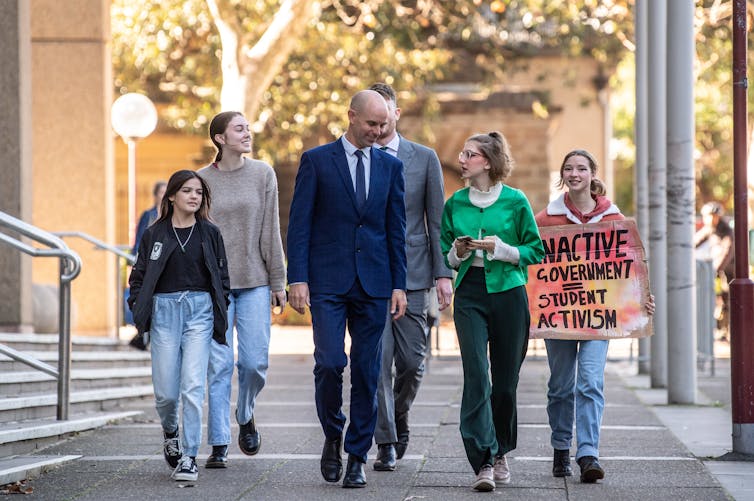Climate science is now more certain than ever. Here's how it can make a difference in Australian court cases
- Written by Laura Schuijers, Research Fellow in Environmental Law, The University of Melbourne
On Monday, the Intergovernmental Panel on Climate Change (IPCC) released its long-awaited report on the physical impacts of climate change. It painted a terrifying picture of a warming planet increasingly subject to extreme weather events.
If there’s a silver lining to the 3,900 pages of gloom, it’s that there’s still time to avert the worst damage if global emissions are rapidly cut. So what happens if the Australian government continues to lag?
Well, while foreign countries can’t sue Australia under the Paris Agreement, they can apply political and economic pressure, such as through publicly calling our leadership out and applying carbon border adjustments.
But we’re also seeing another important and growing trend: domestic climate litigation.
In fact, Australia is second only to the US in terms of the volume of climate change cases brought before the courts.
In the last few years in particular, we’ve seen Australian cases succeed in influencing action. With this new IPCC report, climate science is more certain than ever, making it more likely this trend will continue.
Avoiding catastrophic impacts
The IPCC report concluded that escape from climate change is no longer possible. And, the report indicates, Australia will be badly hit.
It’s believed our best achievable scenario is to reach net-zero emissions by midcentury, on a global scale. This will hopefully equate with an around 1.5℃ temperature rise above preindustrial levels, which is what the IPCC says is our maximum to avoid catastrophic impacts.
Although some countries have made pledges under the Paris Agreement in line with this goal, Australia, we know, is shirking. If all countries adopted targets as weak as ours, global warming would be in the order of 4.3-4.5℃.
While climate change is caused by the actions of many, some are in better positions than others to mitigate it. So it’s no surprise businesses, financial institutions, and governments have been the prime targets of a new wave of litigation.
Courtrooms are changing
Fifteen years ago, the Australian federal court considered the climate change impacts of one particular coal project to be “speculative” and “minute”, citing a “paucity” of detail about the possibility of coal contributing to climate change.
But the situation is changing, and courts are changing with it. One of the reasons for the about-face is the progression of climate science and the availability of new information from advanced modelling. The work of the IPCC is instrumental to this.
A couple of recent examples of cases show how climate science is becoming more influential in Australian court decisions.
In a case heard this week between the Bushfire Survivors group and the NSW Environmental Protection Authority, a NSW court allowed evidence to be presented from former Australian Chief Scientist Penny Sackett on climate change impacts.
It is the first time this kind of evidence has been allowed in a case about the alleged failure of an authority (the EPA) to perform a statutory duty (the regulation of greenhouse gases). On Tuesday, the Bushfire Survivors asked the court to allow her to comment on the IPCC’s sixth report.
 A recent class action case was brought on behalf of all Australian children and teenagers, against Environment Minister Sussan Ley.
AAP Image/James Gourley
A recent class action case was brought on behalf of all Australian children and teenagers, against Environment Minister Sussan Ley.
AAP Image/James Gourley
And in a landmark case in May against the federal environment minister, the federal court found Australia’s young people are at high risk of suffering personal injury from climate change in their lifetime, including death and hospitalisation.
The judge was considering a coal mine approval. He said even though one coal mine won’t single-handedly cook the planet, it could serve as the proverbial straw that broke the camel’s back, given climate science tells us irreversible “tipping points” may be reached one day, and it could be soon.
The judge cited the IPCC’s findings, recognising the IPCC as the authority on climate change, and called on one of its authors as an expert witness.
How will climate science play into future cases?
What’s happening in Australian courts is part of a bigger global trend.
It’s not just that the volume of cases is increasing, cases are also becoming more creative, exploring new avenues to hold polluters and decision makers to account. These cases are more likely to succeed where a link between actions and impacts can be supported with evidence.
In a case against Shell in May this year, a Dutch court ordered Shell to reduce its emissions by 45% by 2030, relative to 2019 emissions. To reach this figure, the court extensively cited the past work of the IPCC. It concluded Shell’s corporate policy was “hazardous and disastrous” and “in no way consistent” with the global climate target to prevent a dangerous climate change for the protection of people, the human environment and nature.
There are many ways climate science will be instrumental to the success of future cases. The evidence released so far by the IPCC shows us different warming scenarios under climate change, each depending on the actions we take now and in the near future.
Chapter 3 of Monday’s IPCC report is dedicated to spelling out the now “unequivocal” influence of humans. This type of evidence could support cases seeking to force government action, as well as cases against businesses for failing to disclose and mitigate climate risk, and for greenwashing.
Read more: Communicating climate change has never been so important, and this IPCC report pulls no punches
Next year, the IPCC will release its findings on impacts, adaptation, and vulnerability. This could support cases relating to fire, flood, and sea-level rise, including human rights cases, property, planning, and insurance cases.
Climate change will unfortunately be costly, and litigation can help determine who should take action, and who should pay.
The more Australia’s governments and businesses lag on climate change, the more litigation we are likely to see. And, the greater the extent leadership decisions are at odds with the science, the stronger plaintiffs’ cases will be.
Authors: Laura Schuijers, Research Fellow in Environmental Law, The University of Melbourne



















